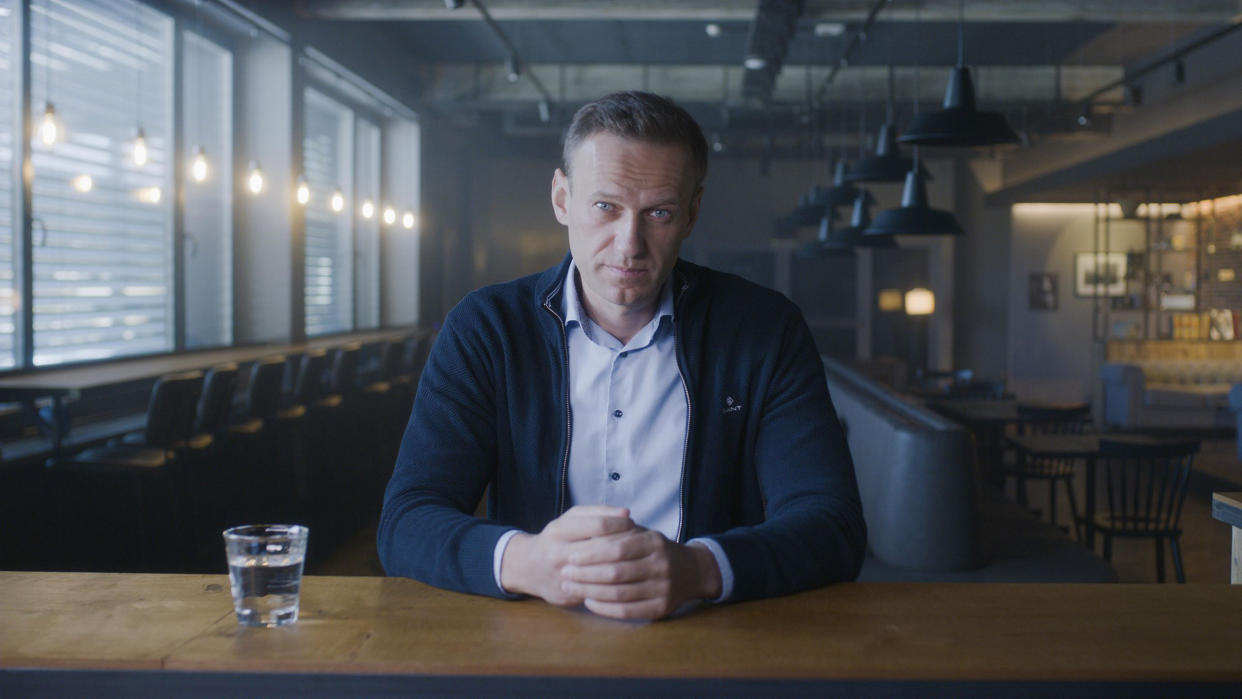Alexei Navalny Had Already Shared a Message for the World in the Event of His Death

- Oops!Something went wrong.Please try again later.
- Oops!Something went wrong.Please try again later.
Alexei Navalny is dead at the age of 47, following three years of incarceration in Russia. He was the most prominent opposition leader to stand against Vladimir Putin during his 24-year dictatorship.
Navalny was also a documentary filmmaker, directing and producing videos on behalf of the organization he founded in 2011, the Anti-Corruption Foundation. His last work before being imprisoned, and arguably his magnum opus, is “Putin’s Palace,” a 112-minute takedown of the leader’s corruption, written, narrated, and directed (though uncredited) by Navalny, which has received over 129 million views on his YouTube channel.
More from IndieWire
The opposition leader was also the subject of the Oscar-winning CNN Films documentary, “Navalny,” directed by Daniel Roher. It’s a clip from that film that’s gone viral in the hours after the Russian prison where he was being held announced Navalny’s death. (Russian officials attributed his death to a blood clot.) The prison is a hard labor camp 40 miles north of the Arctic Circle in Siberia.
In the “Navalny” clip, it was January 2021 and Navalny planned on returning to Russia to continue his activism against Putin in person after spending some time living in exile in Germany. In November 2020, he had been poisoned with a Novichok nerve agent and hospitalized for a month in Berlin. An investigation showed that Russia’s Federal Security Service was likely behind the assassination attempt.
Speaking directly to the camera, Navalny proceeded to tell the director, Roher, and future viewers of the documentary, how to respond in the event of his death — which even then seemed very possible, if not likely.
Navalny said, “Listen, I’ve got something very obvious to tell you. You’re not allowed to give up. If they decide to kill me, it means that we are incredibly strong. We need to utilize this power, to not give up, to remember that we are a huge power, that is being repressed by these bad dudes. We don’t realize how strong we actually are. The only thing necessary for the triumph of evil is for good people to do nothing. So don’t be inactive.”
#Navalny's appeal to Russians in case of his death
🎥 Excerpt from the movie "Navalny" by Daniel Rohr, 2022 pic.twitter.com/QET6hQ122V— NEXTA (@nexta_tv) February 16, 2024
Yulia Navalnaya, Navalny’s wife, gave a speech at the Munich Security Conference shortly after she received news of her husband’s death February 16.
“I want Putin and all his allies, all his friends, his government, I want them all to know that they will be held responsible for what they have done,” Navalnaya said. “They will be punished for what they have done with the country, with my family and with my husband. They will be brought to justice and this day will come soon.”
Leaders of the world’s democracies were unified in condemning Navalny’s death. U.S. Vice President Kamala Harris said that it’s “a further sign of Putin’s brutality” and that Russia is responsible for his death, “whatever story they tell.” French President Emmanuel Macron said that “Free spirits are sent to the gulag and condemned to death.” European Commission president Ursula von der Leyen said, “Putin fears nothing more than dissent from his own people. A grim reminder of what Putin and his regime are all about.”
The UN Human Rights Office said via a statement that its representatives are “appalled” by the death and are calling for an independent investigation.
Navalny was convicted in 2014 on embezzlement, which was widely viewed by outside observers as false charges meant to discredit him with the Russian public. According to the Russian authorities, by living in Germany for some years he had broken parole and so his return to Russia in early 2021 led to his immediate arrest. Already holding him indefinitely, in early 2022 Russia gave him a nine-year sentence for embezzlement and contempt of court, in a ruling Amnesty International called “a sham.”
In August 2023, the court gave him a 19-year sentence on extremism charges, for founding the Anti-Corruption Foundation. He would not have even been eligible for release until 2038.
Navalny was not perfect. He was a Russian nationalist who made racist statements about Russia’s ethnic minorities, such as Kazakhs and Kalmyks. He was against the Ukraine War because he thought the invasion compromised Russia’s strategic interests. Yet through his films and his activism he also helped paint a portrait of who Vladimir Putin really is: Someone who is less a world leader than a mob boss in charge of a mafia state.
His final message in that clip from “Navalny” already seems to be having an impact. A crowd gathered in Moscow to lay flowers in his honor. Larger protest gatherings had already amassed in Berlin and Vilnius. But having protestors come out publicly in Russia, where any dissent at all — including even liking dissenting views deemed anti-Putin on social media — can result in imprisonment, is what he would have wanted most.
Despite everything, that final message is being heard.
English subtitles are available on Navalny’s film “Putin’s Palace” below.
Best of IndieWire
The Best LGBTQ Movies and TV Shows Streaming on Netflix Right Now
Guillermo del Toro's Favorite Movies: 54 Films the Director Wants You to See
Nicolas Winding Refn's Favorite Films: 37 Movies the Director Wants You to See
Sign up for Indiewire's Newsletter. For the latest news, follow us on Facebook, Twitter, and Instagram.

